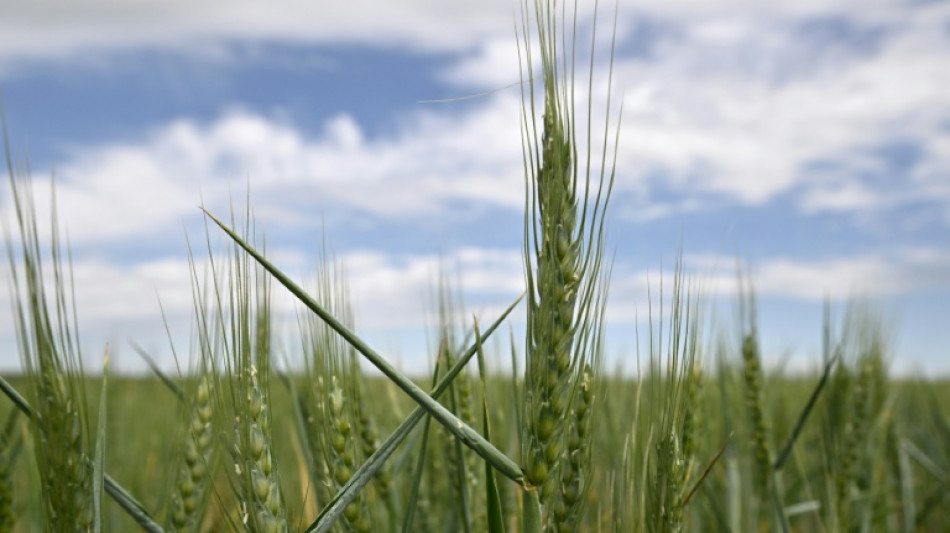
-
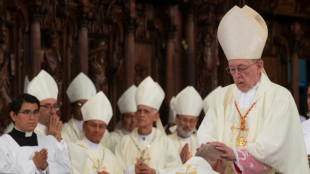 Peruvian cardinal accused of abuse challenges late pope's sanction
Peruvian cardinal accused of abuse challenges late pope's sanction
-
Trans women barred from women's football by English, Scottish FAs

-
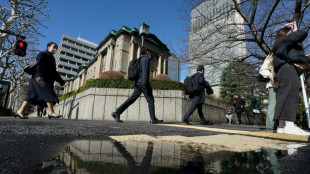 Oil prices drop, stocks diverge amid economic growth fears
Oil prices drop, stocks diverge amid economic growth fears
-
Israel brings fire near Jerusalem 'under control', reopens roads
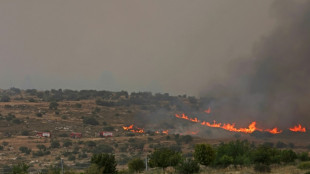
-
 Lopetegui appointed coach of Qatar
Lopetegui appointed coach of Qatar
-
UK counter-terrorism unit probes rappers Kneecap but music stars back band

-
 Yamal heroics preserve Barca Champions League final dream
Yamal heroics preserve Barca Champions League final dream
-
2026 T20 World Cup 'biggest women's cricket event in England' - ECB
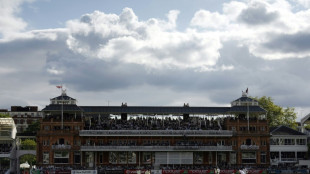
-
 Bangladesh begins three days of mass political rallies
Bangladesh begins three days of mass political rallies
-
Children learn emergency drills as Kashmir tensions rise
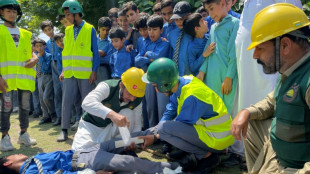
-
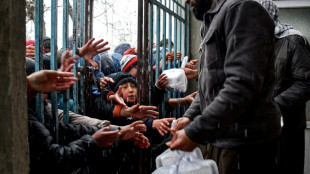 Millions of children to suffer from Trump aid cuts
Millions of children to suffer from Trump aid cuts
-
Veteran Wallaby Beale set for long-awaited injury return

-
 Syria's Druze take up arms to defend their town against Islamists
Syria's Druze take up arms to defend their town against Islamists
-
Tesla sales plunge further in France, down 59% in April

-
 US calls on India and Pakistan to 'de-escalate'
US calls on India and Pakistan to 'de-escalate'
-
Israel reopens key roads as firefighters battle blaze

-
 Europe far-right surge masks divisions
Europe far-right surge masks divisions
-
James will mull NBA future after Lakers playoff exit

-
 Ukraine's chief rabbi sings plea to Trump to side with Kyiv
Ukraine's chief rabbi sings plea to Trump to side with Kyiv
-
Australian mushroom meal victim 'hunched' in pain, court hears

-
 Lakers dumped out of playoffs by Wolves, Rockets rout Warriors
Lakers dumped out of playoffs by Wolves, Rockets rout Warriors
-
Booming tourism and climate change threaten Albania's coast

-
 US reaching out to China for tariff talks: Beijing state media
US reaching out to China for tariff talks: Beijing state media
-
Tariffs prompt Bank of Japan to lower growth forecasts

-
 Kiss faces little time to set Wallabies on path to home World Cup glory
Kiss faces little time to set Wallabies on path to home World Cup glory
-
Serbian students, unions join forces for anti-corruption protest

-
 Slow and easily beaten -- Messi's Miami project risks global embarrassment
Slow and easily beaten -- Messi's Miami project risks global embarrassment
-
Fan in hospital after falling to field at Pirates game

-
 Nuclear power sparks Australian election battle
Nuclear power sparks Australian election battle
-
Tokyo stocks rise as BoJ holds rates steady

-
 Bank of Japan holds rates, lowers growth forecasts
Bank of Japan holds rates, lowers growth forecasts
-
'Sleeping giants' Bordeaux-Begles awaken before Champions Cup semis

-
 Napoli eye Scudetto as Inter hope for post-Barca bounce-back
Napoli eye Scudetto as Inter hope for post-Barca bounce-back
-
Germany's 'absolutely insane' second tier rivalling Europe's best

-
 PSG minds on Arsenal return as French clubs scrap for Champions League places
PSG minds on Arsenal return as French clubs scrap for Champions League places
-
UK WWII veteran remembers joy of war's end, 80 years on

-
 Myanmar junta lets post-quake truce expire
Myanmar junta lets post-quake truce expire
-
Rockets romp past Warriors to extend NBA playoff series

-
 Messi, Inter Miami CONCACAF Cup dream over as Vancouver advance
Messi, Inter Miami CONCACAF Cup dream over as Vancouver advance
-
UN body warns over Trump's deep-sea mining order

-
 UK local elections test big two parties
UK local elections test big two parties
-
US judge says Apple defied order in App Store case

-
 Seventeen years later, Brood XIV cicadas emerge in US
Seventeen years later, Brood XIV cicadas emerge in US
-
Scorching 1,500m return for Olympic great Ledecky in Florida

-
 Israel's Netanyahu warns wildfires could reach Jerusalem
Israel's Netanyahu warns wildfires could reach Jerusalem
-
Istanbul lockdown aims to prevent May Day marches

-
 Classover Holdings Enters into $400 Million Equity Purchase Facility Agreement to Launch SOL-Based Treasury Strategy
Classover Holdings Enters into $400 Million Equity Purchase Facility Agreement to Launch SOL-Based Treasury Strategy
-
ReelTime's (RI) Revolutionary Music Generator Now Available to the Public Allowing Commercial Audio Production Capabilities in Most Languages to the RI Community

-
 Tradable Bits Launches High-Performance Data Reporting Tool Octane for Live Event Organizations
Tradable Bits Launches High-Performance Data Reporting Tool Octane for Live Event Organizations
-
Pivotree Announces Divestiture of Warehouse Management Assets to Tecsys


'This is an atrocity': fears grow that Russian blockade may unleash famine
Staring out over Ukraine's seemingly endless wheat fields near Odessa, Dmitriy Matulyak has a difficult time imagining that so many people may starve soon as another bountiful harvest nears.
The war has been hard on the 62-year-old farmer.
On the first day of invasion, an airstrike hit one of his warehouses, incinerating over 400 tonnes of animal feed as Russian troops fanned out from their bases in the Crimean Peninsula and seized large chunks of southern Ukraine.
"My voice trembles and tears come to my eyes because of how many people I know that have already died, how many relatives are suffering and how many have gone abroad," he tells AFP.
But worse may still lie ahead.
The Russians never stormed the beaches in the nearby port of Odessa as feared, but their ongoing blockade of the Black Sea has been ruinous -- unleashing economic devastation in Ukraine and threatening famine elsewhere.
Silos and ports across Ukraine are now brimming with millions of tonnes of grain with nowhere to go as the country is slowly suffocated by the siege.
In Ukraine's balmy south, the summer harvest is set to begin in the coming weeks, but few know where exactly they will put this season's wheat, stirring fears that large portions of the grain and other food products will be left to rot.
"It's savagery for one country to have food spoiling like this and for other people to be left poor and hungry," says Matulyak. "This is an atrocity. It’s savagery. There is no other way to put it."
- 'Malnutrition, mass hunger and famine' -
While much of the war's focus remains on the grinding battle of attrition in eastern Ukraine, the Black Sea blockade may trigger the most wide ranging consequences from the conflict yet, with experts issuing increasingly dire warnings about surging food prices and potential famine.
Before the Russian invasion, Ukraine served as one of the world's leading breadbaskets -- exporting roughly 4.5 million tonnes of agricultural produce per month through its ports, including 12 percent of the planet's wheat, 15 percent of its corn, and half of its sunflower oil.
The war and its ongoing blockade has largely brought the trade to a halt, with alternative routes by rail and truck unable to tackle the enormous logistical and financial hurdles needed to move so much produce to international markets.
The United Nations Secretary-General Antonio Guterres has been unequivocal on the matter, saying last week that the war "threatens to tip tens of millions of people over the edge into food insecurity".
What might follow would be "malnutrition, mass hunger and famine, in a crisis that could last for years", he warned.
To date, over 20 million tonnes of food products remain stuck in Ukraine, according to Ukrainian authorities.
In southern Odessa, the crisis can be felt acutely. The port remains idle with nothing coming in or going out for months now.
For generations, the economic might of Eastern Europe's fertile agricultural heartlands were largely marshalled in Odessa, with its sprawling port and rail hub connecting the region’s wheat fields to the coast.
That centuries-old link has now been severed.
The city's port and warehouses are currently holding more than four million tonnes of grain, all of which came from the last harvest.
"We won't be able to store this new harvest in any way, that's the problem," says Odessa mayor Gennady Trukhanov.
"People will simply die of hunger," he says if the blockade continues.
- 'Relevant weapons' -
Ukraine's economy has also been ravaged as a result, with World Bank estimates predicting the war and crippling naval siege would likely trigger a 45 percent decline in the country's GDP this year.
And while Ukraine's land forces have proven resilient against a larger, better armed enemy, the Russians continue to enjoy almost complete superiority at sea.
"Unfortunately, Ukraine has traditionally overlooked the issue of maritime security," explained the country's former defence minister Andriy Zagorodnyuk in a paper published by the Atlantic Council.
"While the democratic world has taken up the challenge of arming Ukraine to resist Russian aggression on land, international involvement in the war at sea has been more limited."
Over the weekend, Ukrainian President Volodymyr Zelensky called on the world to intervene, begging for the "relevant weapons" that could help bring the Russians to heel and end the blockade.
"It will create a food crisis if we do not unblock the routes for Ukraine, do not help the countries of Africa, Europe, Asia, which need these food products," the president argued.
But even if given the needed arms, it could take months or longer to kickstart trade again if the war rages on, with shipping companies unlikely to send their fleets into an active conflict zone.
For farmers like Matulyak who were born in the Soviet Union and once enjoyed "brotherly" ties to Russia, the ongoing conflict and its fallout is hard to swallow.
"Of course it would be good if all these issues could be resolved by some diplomatic peaceful means," he says. "But we have already seen that Russia does not understand the normal values people hold."
T.Ward--AMWN